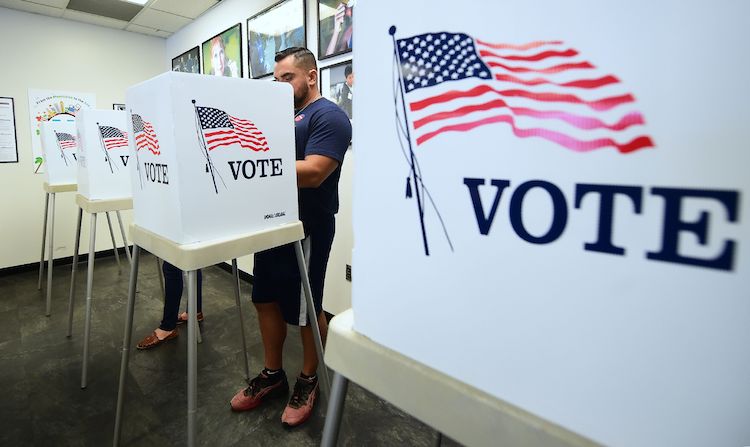Election Law
Judge blocks Trump order on federal elections, says changes ‘could create chaos and confusion’

Voters cast their ballots for early voting at the Los Angeles County Registrar’s Office in Norwalk, California, on Nov. 5, 2018. (Photo by Frederic J. Brown/AFP via Getty Images)
A federal judge in Boston has blocked the Trump administration from significantly overhauling federal elections.
On Friday, U.S. District Judge Denise J. Casper of the District of Massachusetts granted a preliminary injunction sought by attorneys general from 19 states who argued that President Donald Trump lacked the authority to require proof of U.S. citizenship to register to vote and to bar states from counting ballots mailed on or before Election Day but not received until afterward.
Trump announced these changes to the federal elections process as part of an executive order titled “Preserving and Protecting the Integrity of American Elections” on March 25.
“The Constitution does not grant the president any specific powers over elections,” Casper wrote in her memorandum and order. “Rather, the Constitution vests the president with ‘executive power’ and commands him to ‘take care that the laws be faithfully executed.’”
Reuters, the New York Times, PBS News and CBS News have coverage.
According to Reuters, there are several pending challenges to Trump’s March 25 executive order. District Judge Colleen Kollar-Kotelly of the District of Columbia also blocked parts of the order in April, according to Reuters.
Casper, whose order goes further, noted that the states’ challenge to certain provisions of Trump’s executive order are “ripe for review.” She also said the states are likely to be successful in their case and blocked the executive order from taking effect until the case is resolved.
While Casper said there is no dispute that U.S. citizenship is required to vote in federal elections, the issue in this case is whether a president can require documentary proof when only Congress has the power to alter election requirements. She said Congress, through several statutes, does not require proof of citizenship.
As for mail-in ballots, Casper said “the text of the Election Day statutes require only that all votes are cast by Election Day, not that they are received by that date.” She also said the statutes do not authorize the Department of Justice to pursue criminal or civil enforcement actions against states that count ballots in accordance with their ballot-receipt deadlines.
PBS News, citing data from the National Conference of State Legislatures, reports that 18 states and Puerto Rico accept ballots received after Election Day if they are postmarked on or before that date.
Casper’s decision blocks the Trump administration from implementing additional provisions of the executive order, including a directive to the secretary of the Department of Defense to impose voter ID requirements on military members and U.S. citizens who live abroad.
Casper said the challenged mandates in Trump’s executive order “pose the risk of irreparable harm to the states.” She noted that it will take significant time, cost and effort to comply with new requirements, which she also said could “chill voter registration and participation.”
Casper also said states could possibly lose federal funding if they fail to comply with the Trump administration’s executive order.
“The states … have shown a ‘substantial risk’ that, absent an injunction, citizens will be disenfranchised,” Casper said. She added that the states “also credibly attested that the challenged requirements could create chaos and confusion that could result in voters losing trust in the election process.”
Trump “will keep fighting for election integrity, despite Democrat objections that reveal their disdain for commonsense safeguards like verifying citizenship,” said Harrison Fields, a White House spokesperson, in a statement published by Reuters.
“Free and fair elections are the bedrock of our constitutional republic, and we’re confident in securing an ultimate victory in the courtroom,” Fields also said.
Write a letter to the editor, share a story tip or update, or report an error.

